|
|
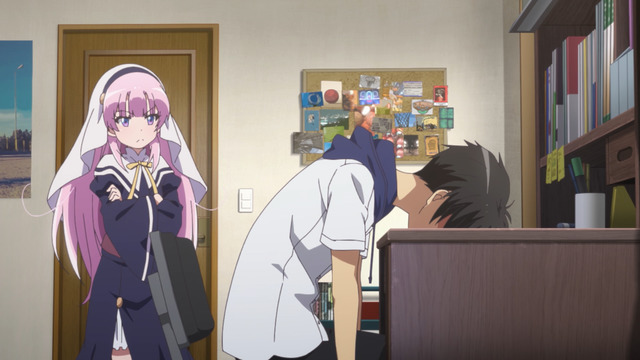
I had to include a picture of these two because they're the main characters.
Despite a promising first episode, Kamisama ni Natta Hi (The Day I Became a God) turned out to be fairly awful in a number of areas, and likely disappointed even fans of Key's usual shtick. Critically, I felt nothing when The Big Sad Thing inevitably happened. This despite reports Maeda Jun intended for it to be the saddest anime ever. Surprising no one, I'm sure, Hina suffers debilitating mental degradation just as Potato-kun comes to realize how important she has become to him. Unfortunately, the way he conveys his emotions and the actions he takes for pretty much the entire rest of the anime are aggravating to watch. It's sort of baffling, even if you're already expecting this to happen to some degree.
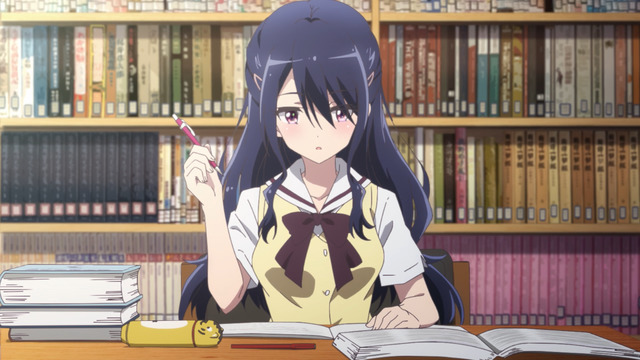
For real, though, Kyouko had excellent hair.
Ultimately, it's entirely unrewarding. I can see how at least in theory Kamisama ni Natta Hi looked like it could succeed when viewed as an outline or synopsis (you know, assuming you're okay with infantalizing love interests), but it certainly fell apart somewhere between the initial pitch and the screen. It's not all bad, though. I genuinely enjoyed the mostly standalone episode where Violet Evergarden and her father come to grips with Dead Mom Subplot. That basically had all the, uh, Key elements of Maeda Jun's bullshit done right. And I liked the Mahjong Calvinball episode which had the sort of high-energy wackiness I remember from the Angel Beats! fishing episode. The Day I Became a God did continue to have some nice gags throughout its run, although the first episode probably had the most successful jokes. I'm still willing to watch the next Key anime, but I get the feeling I'll enjoy it a lot more if its a sports comedy of some sort instead of another romance involving mentally impaired girls.
Posted in Kamisama ni Natta hi | Tags: Autumn 2020, Bad Things Happen to Good People, Hair, Infantilization, Jun Maeda, Key, Moe Blobs, P.A. Works, Romance, Sad Girls in Snow, Season Conclusion, Spoilers, Superlovely Character Designs, Unrequited Love | Permanent Link
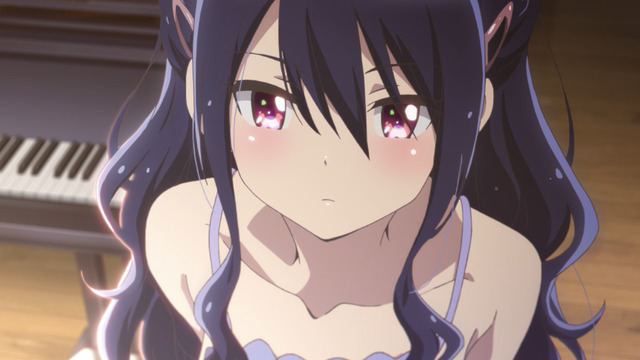
The childhood friend has good hair.
In addition to the shows described in the first and second installments, I am also following Kamisama ni Natta hi (The Day I Became a God). I find its comic timing better than the jokes themselves, but that already makes it better than most other anime comedies. This is also a Key anime, so some sort of trauma is assured by the show's end. It's probably not for everyone, but it's one of the better offerings this season so far.
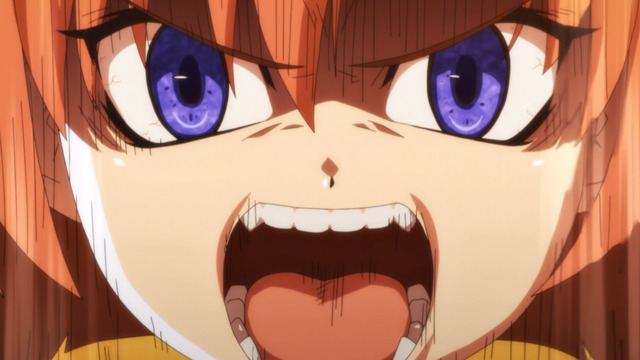
Rena seems sort of upset about something.
I only watched the first episode of the 2006 Higurashi no Naku Koro ni anime, and basically know nothing about the franchise except that it involves lots of murder and possibly time loops? However, I am willing to give 2020's Higurashi no Naku Koro ni - Gou (Higurashi: When They Cry – Gou) a try even though its first three episodes haven't especially impressed me. I'm not even sure why the Gou part of the title needed to be hidden until after the second episode. In any case, it's an excuse for more Yukino Satsuki (see also YashaHime), and I'll presumably enjoy the show more as the mystery develops.
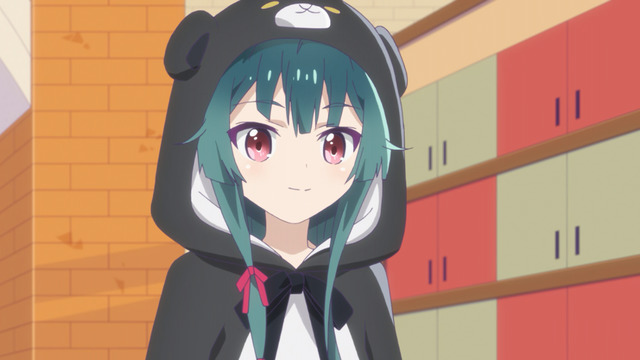
I still don't know why specifically a bear suit, though.
Kuma Kuma Kuma Bear (localized as The Bears Bear a Bare Kuma in English because each Kuma is written differently in the original Japanese title) is a silly show. Events within the first two episodes occurred non-chronologically, but I think that made the first episode more interesting. It's not really fursuit One Punch Man, but I at least enjoy Yuna's unconcerned reactions to fairly absurd events. Incidentally, I'm also enjoying Kawase Maki as Yayoi in Major 2nd S2, so she could be a seiyuu to watch for in the future.
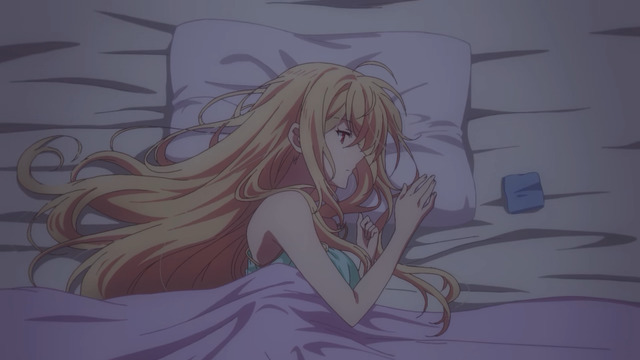
Chicks love handkerchiefs.
Kimi to Boku no Saigo no Senjou, Aruiwa Sekai ga Hajimaru Seisen (Our Last Crusade or the Rise of a New World) is sort of terrible. Like, I don't even feel motivated to point out the parts it really gets wrong. I will mention, though, that it cast Amamiya Sora in the sort of dignified princess roles she was initially known for (e.g., Asseylum from Aldnoah.Zero) before everyone realized Tenchan's true calling was loudmouthed shitbag roles (like Aqua from Konosuba). I'm pretty sure I'm only giving the anime a chance because someone on the Twitter said something nice about the light novels once, but there's also a good chance I've mixed it up with a completely different title.
Posted in Higurashi no Naku Koro ni, Higurashi no Naku Koro ni - Gou, Kamisama ni Natta hi, Kimi to Boku no Saigo no Senjou, Aruiwa Sekai ga Hajimaru Seisen, Kuma Kuma Kuma Bear | Tags: 16-year-old love interests, Autumn 2020, Childhood Friend, Hair, Jun Maeda, Key, Light Novels, Love Confessions, Mysteries, P.A. Works, Remakes, Romance, Season Introduction, Seiyuu, Unrequited Love, war | Permanent Link
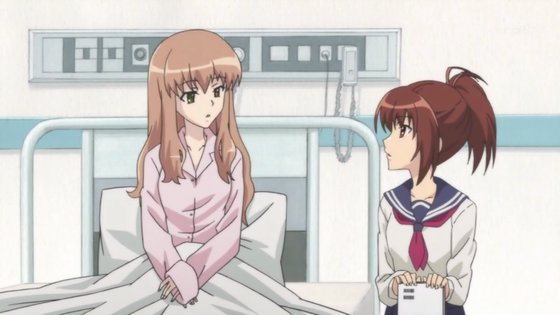
At least Yuki gets to wear pajamas instead of an open-backed hospital gown.
Moshidora received a lot of attention prior to the start of the spring 2011 anime season, probably because it is an anime adaptation of a popular book based on an unusual premise. So just exactly what would happen if a female manager of a high school baseball team read Peter Drucker's Management? Well, apparently she would be better at recruiting members for the team, innovating new tactics, and figuring out what to do with the weenie kid who's a complete liability under pressure because he's a choker.
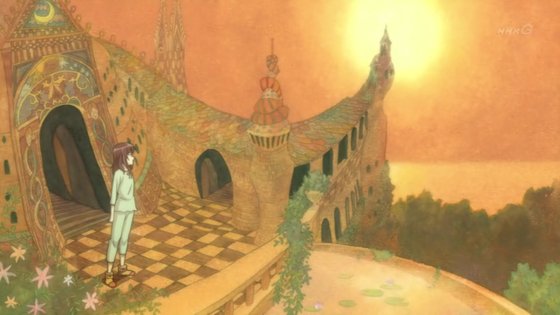
Minami gets to wear pajamas too, even in her hallucination about Innovation.
There are other aspects as well where Minami draws upon Management with almost religious fervor and applies them to her efforts at improving the team on Yuki's behalf—Yuki being Minami's friend and the real manager of the high school baseball team that she is too sickly to manage. (It's never explicitly stated what Yuki's illness actually is, but seeing as how there's no indication she was ever exposed to snow, she's probably not suffering from Key AIDS or Jun Maeda Malaria. My guess is she has leukemia or cancer, although she does maintain her radiant anime-heroine disposition and complexion, so whatever she has doesn't appear too outwardly taxing on her constitution. Also, the weenie kid on the team does not masturbate over her comatose body.
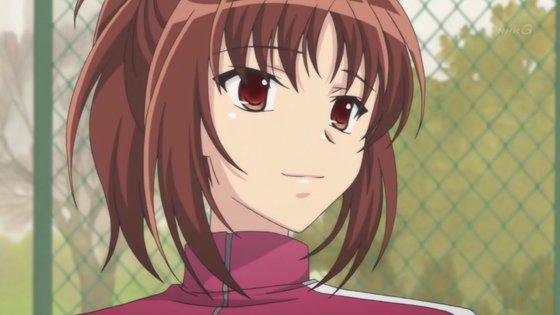
People complained about the animation, but Moshidora does have nice eyes.
After Moshidora aired (it ran 10 weekdays in a row, thus finishing well in advance of other spring 2011 shows), reactions were decidedly mixed. It seems basically anyone who did not have a genuine interest in baseball or business management abandoned Moshidora early. I'm curious what they were expecting, since most of these erstwhile enthusiasts never had any interest in baseball-themed anime in the past. What did they think would be different?
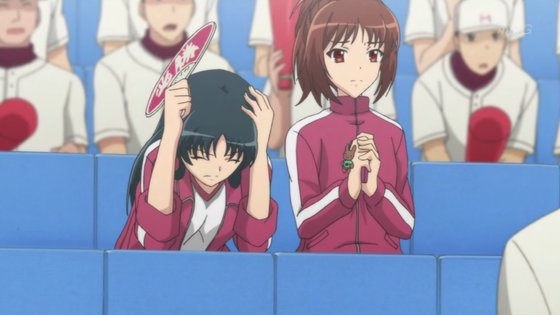
Relax, kid, we do this every day.
Let the record show that Moshidora is a good baseball anime, and a lot more realistic than something like Princess Nine which is good, but not at all authentic. I call Moshidora "realistic" despite the heavy emphasis on an "innovative" tactic the team adopts in response to a Peter Drucker-inspired lesson. The team's [SPOILERS] so-called No Bunt, No Ball strategy, while ridiculous on its face, is grounded in sound baseball principles.
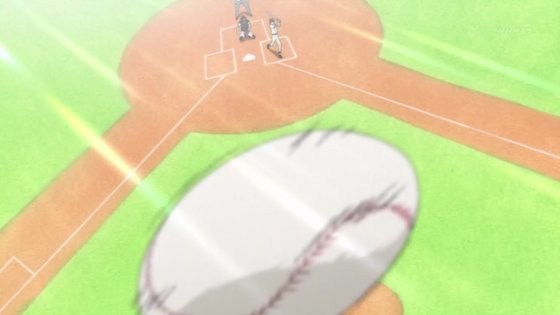
Now batting, number five, Ika Musume Jun Hoshide.
The "no bunt" half of the strategy dictates the team will not sacrifice bunt—ever. This is not necessarily an abandonment of "small ball" entirely, but is a departure from standard Japanese baseball doctrine (at least as depicted in anime): If you have a runner on first with less than two outs, sacrifice him over to second base so he'll be in scoring position for a base hit. Minami's team rejects this strategy entirely, but she may be in good company. Those of you who have read Moneyball or otherwise have a general understanding of sabermetrics will remember Oakland A's general manager Billy Beane despises sacrifice bunts and would never trade an out for a base.
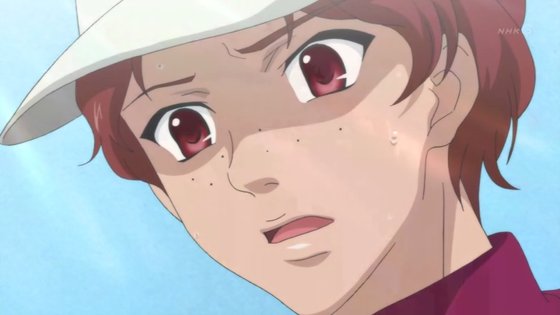
"Letting everyone else do all the work" is dangerous
with a defensive liability in the middle infield.
The "no ball" half of the strategy dictates the team's pitchers will only throw pitches in the strike zone. This part of the strategy is pretty dogmatic, and I have my doubts whether it could realistically be pulled off successfully. However, even this is grounded in sound baseball fundamentals—in this case, a very old fundamental that nobody seems to appreciate anymore: Work fast, throw strikes, and make everybody else do all the work. Those who believe a pitcher should rely on his fastball 75 percent of the time are likely more accepting of the "no ball" strategy, providing Minami's pitchers are able to change speeds, have enough movement on their fastballs, and have enough control to precisely place their pitches' locations, as opposed to basically heaving balls right over the plate (which is what Ryo from Princess Nine essentially does). Valuing control and location is something Big Windup got right, by the way, but I found that show unwatchable because of the ridiculous, relentless crying.
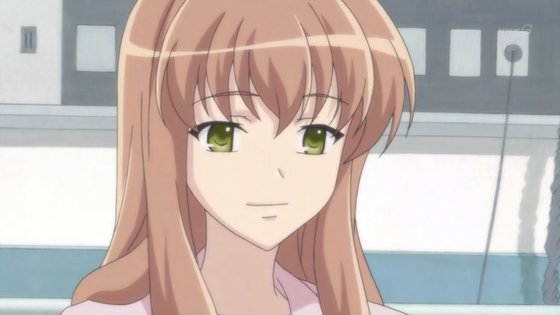
Don't you know it's summer, Yuki? Anime characters
are only allowed to be sick in the winter!
Speaking of which, is there crying in Moshidora? Well, yes, but nearly all of it takes place off the field. You may recall Tom Hanks' insistence in A League of Their Own, "There's no crying in baseball!" This is true, but I can let it go if it occurs outside the lines. In fact, crying is nearly inescapable in a good baseball anime, because—as I've come to realize recently—there is one consistent factor that is present in nearly all good baseball anime and manga. You'll find it in Cross Game, in Touch, in H2 (in basically anything Adachi Mitsuru writes, really), you'll find it A LOT in Major (basically the best baseball anime there is), and you'll even find it in Princess Nine:
Bad things happen to good people.
Baseball is a cruel sport. Despite one's best efforts, defeat and despair often seem unavoidable, and I'm not just talking about Cubs fans. There's a certain sense among players and die-hard fans that the game is rough—that life is unfair—and that stoical dedication to the game through its harshest moments somehow better prepares the baseball enthusiast for the rigors of a demanding world. Perhaps this is why Moshidora could not be an escapist moé blob sanctuary. Certainly it could not have dabbled in that type of otaku-pleasing pandering in its early episodes—even to "grab" casual viewers—and still have had the integrity to execute its final episodes as well as it did. It wouldn't have been proper in a short 10-episode series.
Posted in Moshidora | Tags: Bad Things Happen to Good People, baseball, books, Hanakana Distortion Field, Jun Maeda, Spoilers, Spring 2011, Superlovely Character Designs | Permanent Link
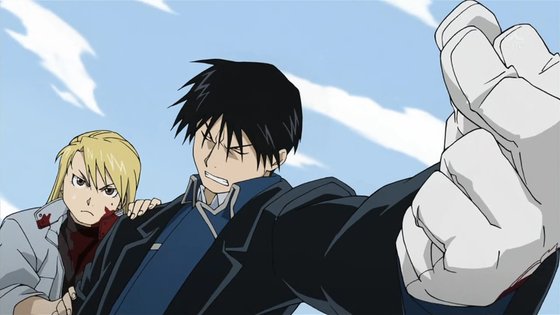
Fullmetal Alchemist: Brotherhood was the best show of Spring 2010.
I can't understand why Fullmetal Alchemist: Brotherhood wasn't more popular. Many fans of the first anime refused to watch it at all, citing unconvincing reasons not to give it a chance. Personally, I suspect one reason they refused to watch it was because at least subconsciously they believed they had "outgrew" it and didn't want to sour nostalgic memories of the enthusiasm they had for Fullmetal Alchemist in their youth.
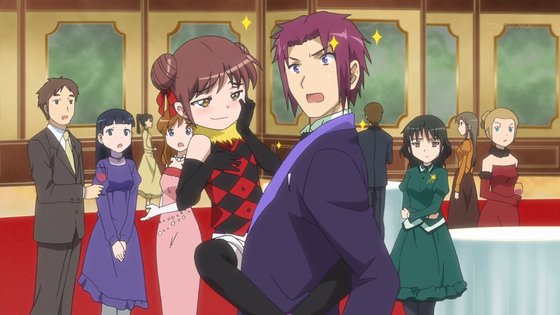
Misato standing in for the homunculus Lust. Misato is dirty.
True, the first 12 episodes did cover a lot of the same territory as the first anime, so it felt like a clip show to those who had watched the previous version, but starting from the episode where they freaking crucify Greed and sink him screaming and hollering into a pool of lava (oops, spoilers), everything is new. You'd think people would be willing to at least give it a chance. There's an entire year's worth of new material, for crying out loud.

How odd. Panthers Stadium looks so much like Dodger Stadium.
Taking second place is the first half of the sixth and final season of Major. I started watching this baseball epic on a goof because I was so dissatisfied with One Outs and how it depicted actual gameplay in the show. I figured I'd try something aimed more toward actual baseball fans. I'm glad I did, because Major has been consistently good and offers the viewer a rare opportunity to follow characters from childhood to adulthood throughout a single mostly unbroken arc. I don't expect non-baseball fans to be as enamored with Major, though.
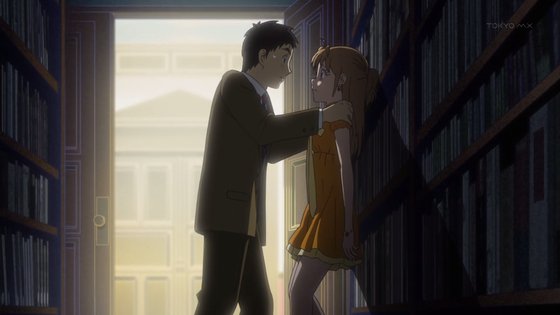
What is it with anime girls and libraries?
B Gata H Kei would have scored a lot higher had it not squandered precious middle episodes fumbling clumsily with Yamada's rival. It's the anime equivalent of not being able to work a bra clasp. However, when all cylinders were firing, B Gata H Kei actually got things moving. It's really refreshing to see anime acknowledging again that sex exists. Compared to his typical Male Protagonist peers, Kosuda is a stud comparable to the likes of James Bond, Sam Malone, and dare I say it...The Fonz, even if he does suffer—as Eddie Murphy put it in Delirious—from occasional difficulties at "finding the pussy."
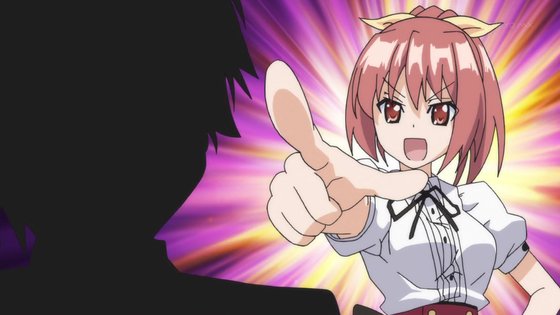
I wasn't expecting to find Minori from Toradora!
in Mayoi Neko Overrun!, to tell you the truth.
Mayoi Neko Overrun! was not a good show, but it had good moments. I also liked its gimmick of changing directors every episode. Thanks to the best tsundere love confession I've ever seen (no, really) in episode three, two solidly brilliant episodes (four and seven), and consistently amusing portions sprinkled throughout (such as bits of the Jenga battle and basically everything Nozomi did as the sole rep for the "bloots" faction of the bloomers v. spandex shorts war), I'm willing to rank Mayoi Neko Overun! fourth—way higher than I expected when I first started watching it. I would definitely watch more if it got a second season.
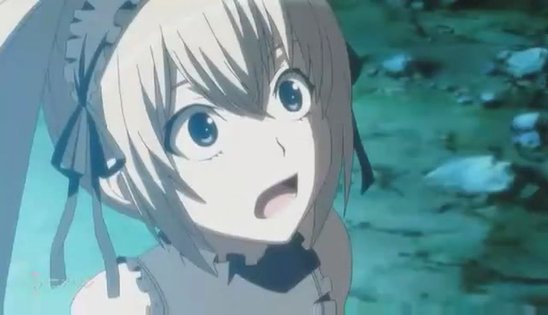
Just so you know, it takes a lot to surprise Katja.
I've only seen 22 episodes of Seikon no Qwaser, so its position in the ranking could change once the remaining uncensored episodes are subbed. [Update: Watched all 24 episodes. No change in the rankings. Looking forward to season two.] Remember how Queen's Blade was so bad it was good? Seikon no Qwaser is so bad that it's AWESOME. This show is amazing. It's unpredictable and consistently manages to impossibly one-up itself as its viewers gape slack-jawed in disbelief. Fullmetal Alchemist could take some lessons from Seikon no Qwaser regarding how to astound viewers with sudden plot twists and intriguing developments. As a bonus, Katja is also one of Hirano Aya's best roles ever.
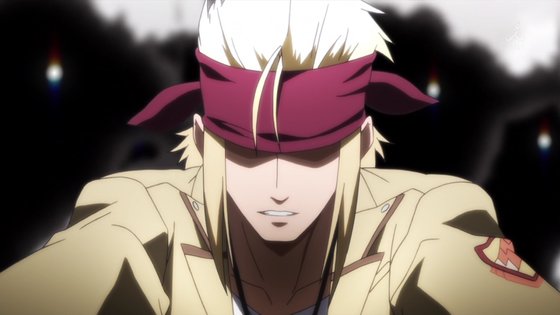
Angel Beats! never explained why TK was
trapped in Japanese high school purgatory.
Angel Beats! Now there's a show that's so bad that it's good. I'm sorry, I could not take a moment of this crap seriously. Nevertheless, it was consistently entertaining and it always inspired—by far—the most discussion of any show airing spring 2010, at least in the cynical IRC enclave I know best. Angel Beats! definitely proved a show does not have to be good to be fun. Unfortunately, I suspect I've now offended many of its fans who disagree with my view of the show. Presumably they have a higher tolerance for Jun Maeda traumadrama than I do.
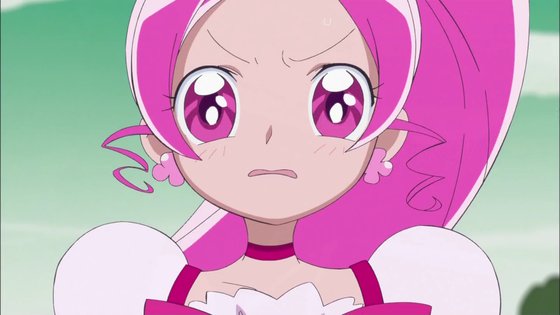
Cure Blossom, the worst Cure ever.
Heartcatch Precure is my least favorite Pretty Cure series thus far. I have two principal complaints about the show: First, Cure Blossom and Cure Marine are the weakest Cures of all time. I understand that's actually supposed to be a plot point, but it doesn't make them any more endearing. What it has done, on the other hand, is make me appreciate Cure Dream from Yes! Pretty Cure 5 a lot more. In her Nozomi guise, Cure Dream is a complete doofus and about as sorry as Tsubomi and Erika when it comes to day-to-day affairs. However, as a Cure, she's pretty solid, even if she does play for the Pretty Cure equivalent of a corporate softball team. Cure Blossom and Cure Marine, on the other hand, shouldn't even be playing in this league. Go back to the minors, losers. My second complaint about Heartcatch Precure is that the monster of the week is always bad feelings. Bad feelings? Really? Heartcatch Precure needs more Dark Precure—a lot more. I bet she doesn't have to take a God damn bus to go fight Pretty Cure when they're out of town.
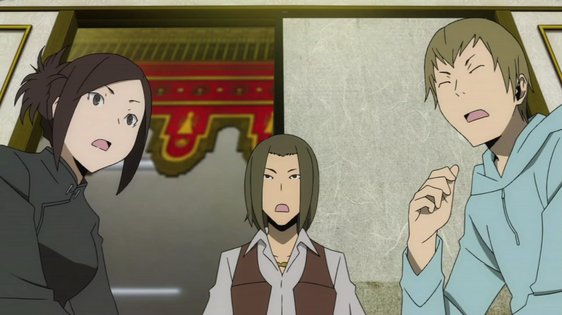
Erika without her hat might as well be naked.
I wanted to like Durarara!! but I couldn't stand Masaomi, Anri, or Mikado. This show would have been a lot more interesting had it been about the crazy stalker girl, the motorcycle cop, and hatless Erika. It's no Baccano!, that's for sure.
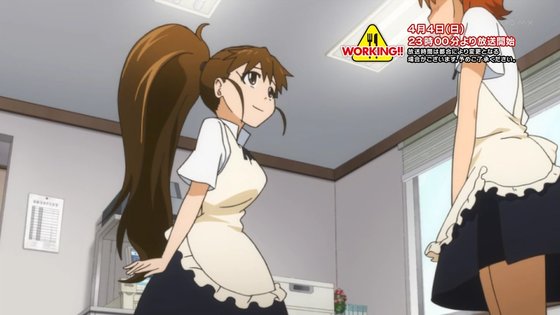
Squirrel-girls? They all suck too.
I dropped WORKING!! after the first episode because I didn't like any of the characters. Well, the only ones I actively disliked were the "minicon" dude and Popura, mostly because I'm tired of anime's obsession with small girls. I heard the show gets good later on, but I've got more Detective Conan to watch. Speaking of which, I didn't include Detective Conan in this lineup because I'm still hundred of episodes behind, but there's a chance you might see it in the summer 2010 wrap up in a few months.
Posted in Angel Beats!, B Gata H Kei, Durarara!!, Fullmetal Alchemist: Brotherhood, Heartcatch Precure!, Major, Mayoi Neko Overrun!, Season Summary, Seikon no Qwaser, WORKING!! | Tags: baseball, Dropped Shows, Harem Comedy, Hirano Aya, Jun Maeda, Mahou Shoujo, Moe Blobs, Plying Girls, Season Conclusion, Spring 2010, tsundere, Yui Horie | Permanent Link
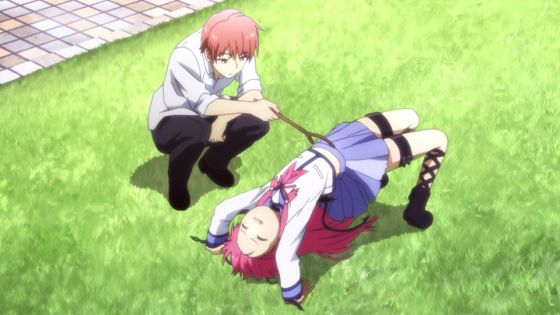
Try, try again.
Just so you know, if Otonashi is the brains of your operation the entire endeavor really should be doomed to fail. He must have Milfeulle's luck.
Posted in Angel Beats! | Tags: Harem Comedy, Jun Maeda, Moe Blobs | Permanent Link
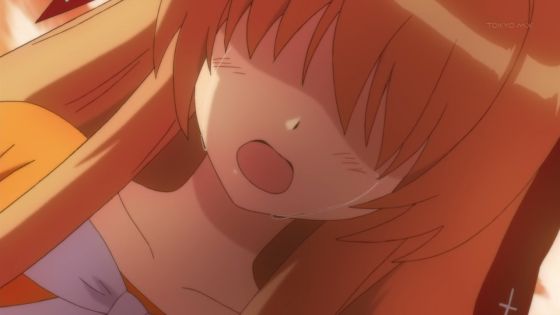
Fumino loses her composure.
Love confessions aren't exactly rare in anime. Indeed, you can't hardly throw a stick in Animeland without hitting a love confession. However, three love confessions this season deserve special mention. First, there is the very nicely delivered love confession in Mayoi Neko Overrun! For one thing, it occurs in episode three—shockingly early for anime. For another, it is basically the best neo-tsundere love confession I've seen.
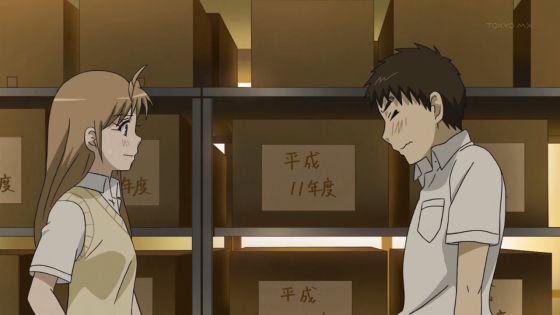
Kosuda professes his love for Yamada.
Second, there is the love confession in B Gata H Kei which is significant because Potato-kun actually nutted it up and said what anime male protagonists as a rule struggle hopelessly with forever. If only Harima had this kind of courage (then Tenma could have rejected him, leaving him re-bound material for the vastly superior Eri). Not only that, he professed his love in front of other people and repeated it more than once to ensure there was no misunderstanding. It's almost heroic.
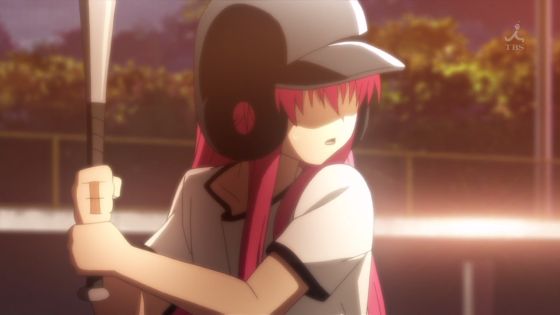
Angel Beats! turned into a baseball anime
so gradually hardly anyone noticed.
Third, there is the love confession in the most recent episode of Angel Beats! I think most people probably expected this for a while, but its execution was a bit better than I was expecting. I still can't claim to care about any of the Angel Beats! characters, but I do appreciate some good melodrama once in a while, even if it isn't snowing.
Posted in Angel Beats!, B Gata H Kei, Mayoi Neko Overrun! | Tags: baseball, Harem Comedy, Jun Maeda, Love Confessions, Moe Blobs, Spring 2010, tsundere | Permanent Link
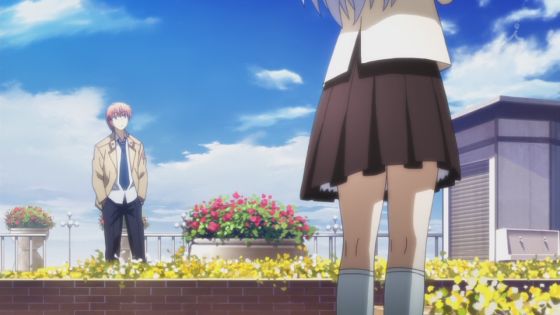
Tenshi, your slip is showing.
Angel Beats! is fun to watch because when it's bad it's fun to mock. Somewhat unexpectedly, it can also be legitimately good at times. I'm referring to gags like the broom bit during the baseball episode and the entire second half of episode seven. But yeah, when Angel Beats! is bad, it's dog shit. [I feel obliged to offer a spoiler warning at this point, even though everything revealed about the first half of episode seven will be transparently obvious to anyone with the slightest familiarity with Jun Maeda, Key, or anime clichés in general.]
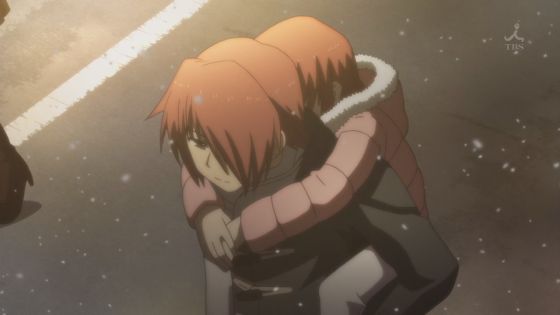
Potato-kun kills his kid sister. Good job, guy.
Did you not watch Clannad? Kanon?
The first part of Angel Beats! 07 finally reveals Otonashi's back-story. Like the other previously revealed back-stories, it is a tale of woe and sorrow. It also happens to be a tale of idiotic melodrama. I don't know why Jun Maeda has a vendetta against snow. The sad-girls-in-snow motif has transcended its status as a mere trope and can now be considered a straight-up base anime stereotype. With that in mind, there couldn't possibly have been a single person watching Angel Beats! episode seven who thought it was a good idea for Otonashi to carry his sickly good-natured little sister (hospitalized for years due to some vague, undefined illness) out into the snow on his back on Christmas. Why not build an asbestos snowman while you're at it?
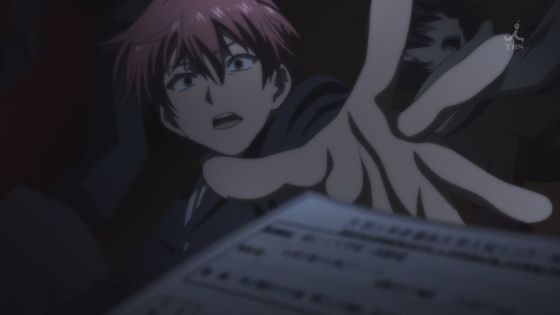
Otonashi trades his acceptance notice for a mapo tofu food coupon.
So, yeah, snow does to Otonashi's little sister what snow does to all of Jun Maeda's sickly girls. However, Otonashi finds new purpose in his life and strives to make something of himself so he can Protect Other People. Unfortunately for Otonashi, SNOW has different ideas. This brings us back to this present misery where the story makes a drastic change in tone and turns into a comedic fishing farce out of nowhere. Cue Operation Monster Stream, a "zetsubou no carnival."
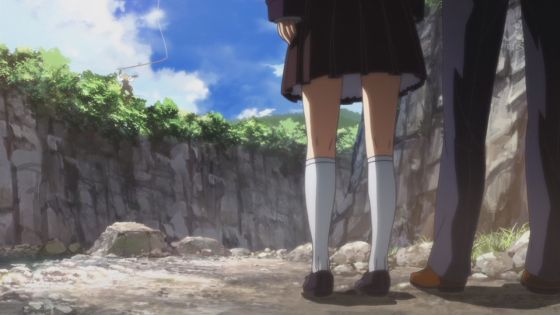
There sure are a lot of Kanade petticoat shots in this episode.
[Spoilers: Petticoat shots are the new panty shots.]
Angel Beats! is getting a lot of mileage out of Tenshi Tachibana Kanade and her quiet deadpans. I haven't seen a fishing episode like this since Sky Girls. Like the Sky Girls fishing omakes, the second half of Angel Beats! 07 does not have any bearing on the plot as far as I can tell, but is instead merely an excuse for the characters to do goofy things for silly reasons. It works, as a matter of fact. Angel Beats! really needs a lot more of this sort of thing. Episode seven ends on a cliffhanger, so presumably the next episode will return to the main story and plot development. I'm not entirely sure that's a good thing.
Posted in Angel Beats! | Tags: Fishing, Jun Maeda, Sad Girls in Snow | Permanent Link
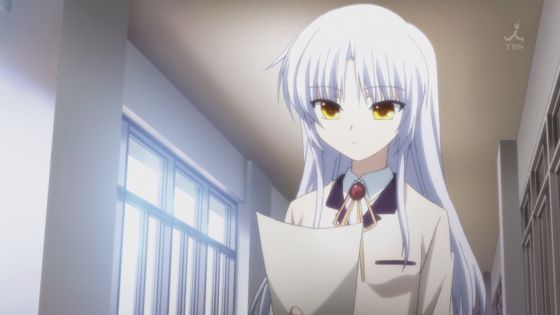
The only Angel Beats! character I don't dislike
is the one that doesn't talk or do anything.
I'm not going to call Angel Beats! a lousy show, but it's not one that I can take seriously without feeling foolish. Nevertheless, Angel Beats! generates more discussion than any other show at a certain IRC channel where idling slowly is preferred. Granted, approximately one-hundred-point-all percent of this discussion is derisive, but everyone seems to acknowledge that it is interesting to discuss even if they don't necessarily enjoy the show. (I sort of felt the same way about Gundam SEED Destiny.)
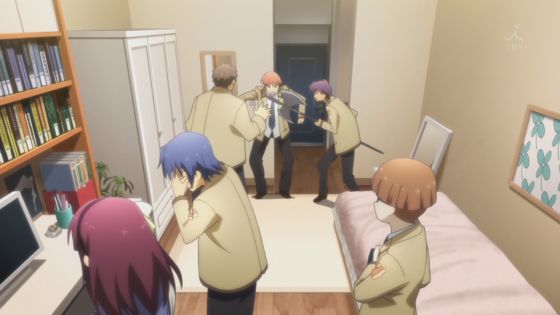
Tenshi's room is depressingly drab. I guess it's
still better than Minori's spartan bedroom.
My favorite part about episode three was discovering Tenshi apparently lives in a painfully normal and somewhat boring dorm room that she keeps immaculately clean. As far as I'm concerned, this just lends credence to my theory that Tenshi is the actual protagonist of the show, a fact that is sure to be revealed in some melodramatic twist two-thirds of the way through the series. It probably has to do with snow and piano recitals.
Posted in Angel Beats! | Tags: #marimite, Bedrooms, Instrument Goggles, Jun Maeda, Spring 2010 | Permanent Link
|
|



































